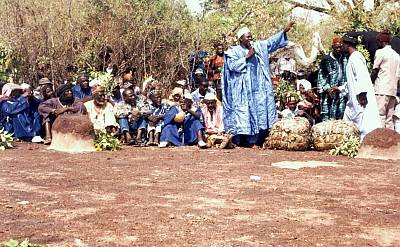- Mali

The Manden Charter in Mali

© DNPC, 2003
1. ICH domains
Oral traditions and expressions, social practices
2. Short description
Conceived in the Malian Empire in the 13th Century, the Manden Charter set out the laws under which Malinke clans would live. The charter, one of the oldest constitutions in the world, emphasises social peace in diversity, the sanctity of human life, education, the integrity of the country, food security, the abolition of slave-raiding, freedom of expression and enterprise, and environmental protection. The Manden Charter continues to regulate many aspects of Malinke community life in western Sub-Saharan Africa. The charter was inscribed by UNESCO in 2009 on the Representative List of the Intangible Cultural Heritage of Humanity.
See link to nomination file: https://ich.unesco.org/en/RL/manden-charter-proclaimed-in-kurukan-fuga-00290
Further information:
Mangoné, N. 2006. The Kurukan Fuga Charter: An example of an endogenous governance mechanism for conflict prevention. Inter-generational Forum on Endogenous Governance in West Africa. Vol. 2, pp. 72-83. http://www.oecd.org/swac/events/38516561.pdfThe BBC has produced a 55-minute audio programme on the Charter, outlining its history and meaning today, in West Africa and beyond:
http://www.bbc.co.uk/programmes/p02tj82x
For additional information on the Manden Charter, see:
Cissé, Y. T. 2003. La charte du Mandé et autres traditions du Mali. Paris, Albin Michel.Ki-Zerbo, J. and Nianie, D.T. (eds). 1998. Africa from the Twelfth to the Sixteenth Century (Abridged Edition). UNESCO General History of Africa, Vol. IV. Berkeley, University of California Press.
3. Link with sustainable development
The Manden Charter contributes to the prevention of disputes and to the peaceful resolution of conflicts in the region. Scholars point out that an examination of the charter clearly indicates that its authors upheld human rights, liberty of movement of people and property, and the freedom of individuals to enjoy the fruits of their labour. The charter also constitutes a major document for traditional mediation. In recognition of this, annual ceremonies to commemorate the enactment of the charter are backed by the Malian authorities, who see it as a source of law and as a way to promote a message of love, peace and fraternity. As such, the Manden Charter more broadly reflects SDG 16, dedicated to promoting just, peaceful and inclusive societies.4. Questions for reflection
The continued transmission of the Manden Charter may be increasingly at risk as young people move and settle in large towns, and their occasional visits to the village are insufficient for mastering all aspects related to this element, in turn weakening its oral transmission.
What can be done to ensure its continued transmission with the younger generation given their move to urban centres?
Do you know of other examples similar to the Manden Charter?